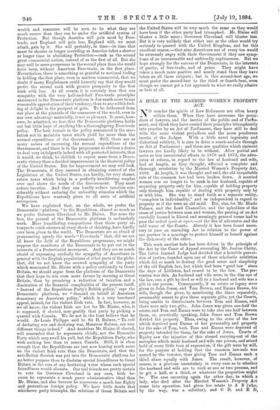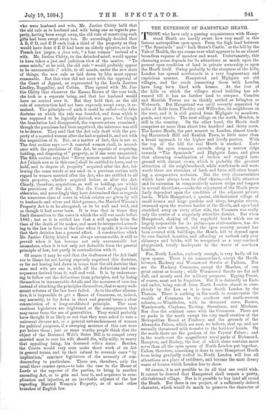A HOLE IN THE MARRIED WOMEN'S PROPERTY ACT.
NO wonder the spirits of Law Reformers are often heavy within them. When they have overcome the preju- dices of lawyers, and the inertia of the public and of Parlia-
ment, and think they have carried their principles triumphantly into practice by an Act of Parliament, they have still to deal with the more violent prejudices and the more ponderous inertia of the Judges. With a little novel ingenuity and dialectical subtlety, it is easy to drive a coach-and-six through
an Act of Parliament ; and these are qualities which eminent lawyers are hardly likely to be without. After partial and more or less unsuccessful efforts in 1870 and 1874, the advo- cates of reform, in regard to the law of husband and wife, had at length, as they thought, effected a complete and thorough revolution by the Married Women's Property Act, 1882. At length, it was thought and said, the old inequitable rule of the common law had been broken down. A married woman was no longer to be sunk in her husband, capable of acquiring property only for him, capable of holding property only through him, capable of dealing with property only by or with him. She was to stand forth as a separate entity, "complete in individuality," and as independent in regard to property as if she were an old maid. But, alas, for Mr. Hinde Palmer, and the Lord Chancellor, and the upholders of the cause of justice between man and woman, the passing of an Act carefully framed in liberal and seemingly general terms had to pass the ordeal ignis et agua,,—.of the fire of advocates and the cold water of the Courts. Already it has been found neces- sary to pass an amending Act in relation to the power of one partner in a marriage to protect himself or herself against the dishonesty of the other.
This week another hole has been driven in the principle of the Act by the Court of Appeal overruling Mr. Justice Chitty. The latter learned Judge had decided that a horrible perver- sion of justice, founded upon one of those scholastic subtleties which did so much to destroy the good sense and simplicity of the old English law, but which had been "good law " since the days of Littleton, had ceased to be the law. The per- version was this. As husband and wife were, in the dim eye of the law, one, a gift by deed or will to a husband and wife was a gift to one person. Consequently, if an estate or legacy were given to John Jones, and Tom Brown, and Emma Brown, his wife, though the giver, by mentioning the three separately, presumably meant to give three separate gifts, yet the Courts, being unable to discriminate between Tom and Emma, said there were only two gifts. John Jones was given one-half the estate, and Tom and Emma were to take also one-half between them, or, practically speaking, John Jones and Tom Brown divided the property. Thus, owing to the state of the law which deprived poor Emma of her personality and property for the sake of Tom, both Tom and Emma were deprived of property intended for them, for the sake of Jones. Courts of Equity saw the injustice of this absurd carrying-out of the metaphor which made husband and wife one person, and seized hold of every little turn of expression, if the gift were by will, for the purpose of holding that the common law-rule was ousted by the testator, thus giving Tom and Emma each a third share equally with Jones. The result, however, of course, is a glorious uncertainty in every case as to whether the husband and wife are to rank as one or two persons, and to get a half, or a third, or whatever the proportion might be. The case occurring again the other day, in which a lady, who died after the Married Women's Property Act came into operation, had given her estate to A B (who, by the way, was a solicitor), and C D, and E D, who were husband and wife, Mr. Justice Chitty held that the old rule as to husband and wife being one as regards pro- perty, having been swept away, the old rule of construing such gifts had been swept away too. He accordingly decided that A B, 0 D, and E D each took a third of the property as they would have done if E D had been an elderly spinster, or in the French law jargon, a feme sole," a lone woman " instead of a wife. Mr. Justice Chitty, to the detached mind, would appear to have taken a just and judicious view of the matter. "To some minds," as he said, the old rule " would probably appear to be unreasonable ;" while, to all minds, under the new state of things, the new rule as laid down by him must appear reasonable. But this view did not meet with the approval of the Court of Appeal, as represented by the Lords Justices Lindley, Baggallay, and Cotton. They agreed with Mr. Jus- tice Chitty that whatever the Emma Brown of the case took, she took as a separate being, and that her husband would have no control over it. But they held that, as the old rule of construction had not been expressly swept away, it re- mained. The principle—if such it could be called—the false doctrine on which the rule was founded, and from which it was supposed to be logically derived, was gone ; but though the foundation had disappeared, the superstructure remained ; though the premisses had been negatived, the inference was still to be drawn. They said that the Act only dealt with the pro- perty of a married woman after she had acquired it, and not with the acquisition of it. But, as a matter of fact, this is not so. The first section says :—" A married woman shall, in accord- ance with the provisions of this Act, be capable of acquiring, holding, and disposing of " property, as if she were unmarried. The fifth section says that " Every woman married before the Act [which was so in this case] shall be entitled to have, and to hold, and to dispose of, property" acquired after the Act, fol- lowing the same words as are used in a previous section with regard to women married after the Act, who are entitled to all their property, whether acquired before or after the Act. Clearly, therefore, acquisition, as well as holding, are within the provisions of the Act. but the Court of Appeal held otherwise, and accordingly they have determined that as regards the numerous class of cases in which estates are given by will to husbands and wives and third persons, the Married Women's Property Act is to be abrogated, or to be null and void, and as though it had never been. It is true that in terms they limit themselves to the cases in which the will was made before 1883 ; but as it is settled law that a will speaks from the time of the death of its maker, and must be interpreted accord- ing to the law in force at the time when it speaks, it is obvious that their decision has a general effect. A construction which Mr. Justice Chitty hinted was always unreasonable, is still to prevail when it has become not only unreasonable but anomalous, when it is not only not deducible from the general principle of law, but partly in contradiction with it.
Of course it may be said that the draftsmen of the Act itself are to blame for not having expressly negatived this doctrine, or for not having laid down in terms that the old doctrine that man and wife are one is, with all the deductions and con- sequences derived from it, null and void. It is, by endeavour- ing to follow out the deductions from principles, and by losing themselves in innumerable details and the morasses of case-law instead of attacking the principles themselves, that so many well- meant reforms of the law have failed. As to the other alterna- tive, it is impossible to get. a House of Commons, or, indeed, any assembly, to lay down in short and general terms a clear renunciation of a long-established principle. The most cautious legislators are frightened at the consequences that may ensue from the use of generalities. They would probably have thought it as likely as not that they were asked to vote a universal divorce act, or a general enfranchisement of women for political purposes, if a sweeping measure of this sort were put before them ; just as some worthy people think that the object of the Deceased Wife's Sister Bill is to compel every married man in case his wife should die, willy-nilly, to marry that appalling being, his deceased wife's sister. Besides, the Courts would very soon make short work of an Act in general terms, and by their refusal to overrule cases " by
implication," convince legislators of the necessity of con-
descending to particulars. There are, therefore, only the usual three courses open,—to take the case to the House of Lords at the expense of the parties, to bring in another amending Act, or to grin and bear it, and acquiesce in com- plication and injustice, as an inevitable adjunct of the law regarding Married Women's Property, as of most other branches of English law.



































 Previous page
Previous page